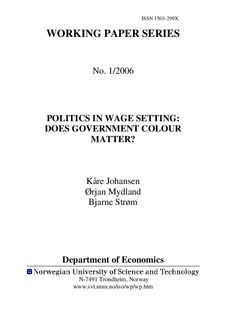| dc.contributor.author | Johansen, Kåre | nb_NO |
| dc.contributor.author | Mydland, Ørjan | nb_NO |
| dc.contributor.author | Strøm, Bjarne | nb_NO |
| dc.date.accessioned | 2014-12-19T14:31:45Z | |
| dc.date.available | 2014-12-19T14:31:45Z | |
| dc.date.created | 2006-10-02 | nb_NO |
| dc.date.issued | 2006 | nb_NO |
| dc.identifier | 126046 | nb_NO |
| dc.identifier.uri | http://hdl.handle.net/11250/267077 | |
| dc.description.abstract | This paper studies the relationship between wage formation and the political colour of the government in an economy with centralized wage bargaining. Ideological, organizational and personal ties between the central trade union and the social democratic political party suggest that the trade union may behave significantly different in wage negotiations under a social democratic than under a conservative government. Using time series data for Norway, we estimate that changing from a conservative to a social democratic central government significantly reduces manufacturing wages and makes wages more responsive to unemployment. This result is consistent with a wage bargaining model augmented by political preferences of the union leaders and suggests that the effect of bargaining coordination depends on the political colour of the government. The estimated effects are both robust with respect to model specification and stable over time. | nb_NO |
| dc.language | eng | nb_NO |
| dc.publisher | Institutt for samfunnsøkonomi | nb_NO |
| dc.relation.ispartofseries | Working Paper Series, 1503-299X; 2006:1 | nb_NO |
| dc.title | Politics in Wage setting: Does government colour matter? | nb_NO |
| dc.type | Research report | nb_NO |
| dc.contributor.department | Norges teknisk-naturvitenskapelige universitet, Fakultet for samfunnsvitenskap og teknologiledelse, Institutt for samfunnsøkonomi | nb_NO |
